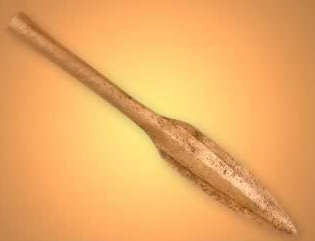Origin of Science and technology
Sharp projectiles
Creating tools and weapons with sharpened
points or tips
Humanity’s first use of sharp projectiles
predates history, as three wooden spears found in schoningen. Germany, show
that Homo heidelbergensis had used projectile weapons by at least 400,000 BCE,
and the longest of the three spears measured 7 feet 7inches (2.3m) long and all
of them had a thicker section toward the front in the style of the modern
javelin, which suggest that they were specifically used for throwing rather
than thrusting. By 300,00BCE, Homo heidelbergensis had begun using shaped stone
spere point, and by 64,000 BCE stone tipped arrow heads first appeared in south
Africa.
 Until the development of sharp projectiles,
humans had to rely on blunt weapons, such as rocks, throwing sticks, and their
hands and teeth. Sharp projectiles were far superior to blunt weapons as they
were not only deadlier, but also could be used from greater distance. This
allowed people to hunt larger, more dangerous game while retaining some measure
of security. Sharp projectiles spurred technological development, leading inventors
to develop new methods of shaping stones, developing wood working techniques,
and eventually, mining and casting metals.
Until the development of sharp projectiles,
humans had to rely on blunt weapons, such as rocks, throwing sticks, and their
hands and teeth. Sharp projectiles were far superior to blunt weapons as they
were not only deadlier, but also could be used from greater distance. This
allowed people to hunt larger, more dangerous game while retaining some measure
of security. Sharp projectiles spurred technological development, leading inventors
to develop new methods of shaping stones, developing wood working techniques,
and eventually, mining and casting metals.
As further evidence of their importance,
groups of wild chimpanzees in Senegal have recently been observed to fashion
their own sharpened projectiles from tree branches for use in hunting. The frequency
of projectile use was found to be higher among female chimpanzees, leading
researchers to speculate that females may have played a key role in the evolution
of tool technology among early humans.
Ever since the appearance of sharpened
projectiles, human cultures have refined, perfected, and revered them for their
simplicity and deadly efficiency. As the primary tools of warfare and survival,
they were not replaced until relatively recently in human history when firearms
became effective and widely available.
 |
| Add caption |









